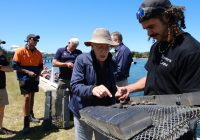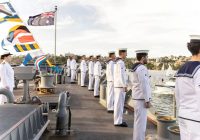The South Australian Malinauskas Government will provide immediate, backdated fee relief for commercial fishers, aquaculture and charter boat operators impacted by the algal bloom affecting South Australia’s coastline.

Peter Malinauskas MP
A significant harmful algal bloom, caused by the species Karenia mikimotoi, has been impacting large areas of South Australia’s coastline since March 2025. The naturally occurring algal bloom has caused widespread marine mortalities and disruption to commercial fisheries and aquaculture operations.
Some operators in the Marine Scalefish Fishery have experienced declines in catch and economic viability, particularly in Gulf St Vincent, Kangaroo Island, and the Yorke Peninsula. Some oyster growers and pipi harvesters have also been affected. Charter boat operations and fisheries around the River Murray mouth and Lakes and Coorong have been impacted to varying degrees.
On Friday, the State Government hosted a forum with key stakeholders affected by the algal bloom and a number raised fee relief as a State Government measure which could provide immediate help.
In recognition of the ongoing impact, the State Government is offering an initial relief package to affected licence holders to waive fees from April to June 2025, which will equate to an estimated $500,000 worth of fee relief.
Eligible fees for relief consideration include:
- PIRSA Fisheries and Aquaculture annual licence fees
- Biosecurity SA Food Safety Scheme and audit fees
- Aquaculture lease and licence fees
The Department of Primary Industries and Regions (PIRSA) will continue working with the Marine Fishers Association (MFA), the South Australian Professional Fishers Association (SAPFA) and the South Australian Oyster Growers Association (SAOGA) to assess the scale of the impact and target support.
Impacted licence holders are encouraged to work with their industry association to access the fee relief process. Industry associations are compiling claims and submitting them to PIRSA for assessment.
If you are not a member of an association or represent yourself independently, you can contact PIRSA directly via telephone 08 8207 5332 , or email .
Fisheries and aquaculture licence holders facing financial hardship due to the algal bloom are eligible for the South Australian Government Rural Support Grant, administered by the RBS Relief Fund, where individuals can receive up to $1,500 in financial assistance to help cover essential household expenses such as utilities, groceries, rates and medical costs.
Support is also available for licence holders facing financial hardship through the Rural Financial Counselling Service (RFCS) and the Family and Business Support (FaBS) Program. These services provide financial counselling and wellbeing support for primary producers experiencing hardship.
For more information visit pir.sa.gov.au/fee-relief
Ben Barnes, Chairperson, South Australian Professional Fishers Association said, “We welcome the Malinauskas Government’s announcement of fee relief for commercial fishers impacted by the ongoing algal bloom.
This support recognises the severe and sustained disruption our fishers have faced over recent months, with many experiencing reduced catches, lost income, and long-term uncertainty.
Waiving licence and associated fees during this period is a practical and appreciated step that will help ease financial pressure while operators work to recover from the impacts of this natural event.”
Pat Tripodi, Executive Officer, Marine Fishers Association said, “The algal bloom is an unprecedented event and has had real impacts on our state’s fishing industry.
We’ve been in regular communication with PIRSA on the needs of our marine scale licence holders, and we are pleased the government is acting to assist impacted fishers.
While we continue to assess the ongoing impacts of this event, we will continue to work closely with the government to ensure our state’s world class seafood remains on South Australian dinner tables and in restaurants.”








